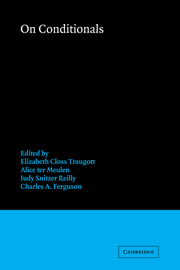4 - CONDITIONALS: A TYPOLOGY
Published online by Cambridge University Press: 04 August 2010
Summary
INTRODUCTION
The aims of this paper are, first, to attempt a characterization of conditionals that has crosslinguistic validity and, second and more important, to try to identify the significant parameters in the crosslinguistic description of conditionals, looking both at properties that are common to all languages and at properties that show significant crosslinguistic variation. The claim that a given parameter of variation is significant is, of course, an empirical claim, and it may well be that in further work on this topic other parameters, of which I am unaware or which I consider insignificant, will need to be added to my list.
Two general remarks are necessary before embarking on the characterization of conditionals and crosslinguistic variation within conditionals: these relate to the general problem of isolating a given construction, both intralinguistically and interlinguistically, and to the general problem of identifying the meaning of a construction. I assume that a given construction is to be identified, in general, in terms of a prototype rather than in terms of necessary-and-sufficient conditions. Thus, I will not be surprised if some sentences having the form of prototypical conditionals in a given language do not in fact receive the interpretation of conditions (as when English If you do that, I'll hit you is interpreted as a prohibitive), nor if sentences that do not have the form of prototypical conditionals nonetheless receive a conditional interpretation (cf. the parallel interpretations in English of If he came late, he was punished and Whenever he came late he was punished).
- Type
- Chapter
- Information
- On Conditionals , pp. 77 - 100Publisher: Cambridge University PressPrint publication year: 1986
- 66
- Cited by



